Two years ago, specifically on May 5, 2020, I posed a question to researchers on my Instagram account story: “How long does it take you to read and assimilate one research paper?” The responses I received varied greatly. I recall one person saying, “Forever. You might lose the author’s train of thought and have to reread the paper!” Another individual stated, “For a thorough reading, it takes about 2 hours. For more abstract research papers, maybe a day.” Here, I present a summary of the responses received.






After compiling the statistics based on the answers, the time required to read a research paper for referencing purposes can be summarized as follows:
- Minimum: 10 minutes
- Maximum: 30 minutes
- Average: 25 minutes, taking the range into consideration.
Regarding the task of adequately assimilating the paper, the time estimates are as follows:
- Minimum: 1 hour
- Maximum: Forever or indefinitely, as it might end up in the “read later” folder, never to be revisited.
- Average: 9.17 hours, considering the ranges and excluding the concept of infinity.
As a researcher myself, I completely understand these responses, as I have experienced situations where reading a research paper seems to be an arduous and time-consuming process. As the responses indicate, the time required to read and assimilate a research paper depends on its length and complexity.
Ensuring that research papers are thoroughly proofread is crucial for conducting meaningful and significant research. It cannot be emphasized enough. Reading research papers is a significant part of a researcher’s work, whether it’s to stay up to date in their field, enhance their understanding, review manuscripts, or gather information for a project proposal, grant application, or thesis. Since research papers differ from other types of texts, such as novels or newspaper stories, they should be approached with a distinct reading strategy.
However, this experience can either be an exhilarating adventure or a daunting task for researchers due to the significant amount of time required to fully comprehend and grasp the authors’ intended message. As you read this blog post, you may find yourself thinking, “Oh, I thought I was the only one experiencing this??” Rest assured, you are not alone, and there is absolutely nothing wrong with taking an entire day to complete a single research paper. At times, it is because you are attempting to absorb years of study, research, analysis, and knowledge all at once.
I vividly recall my time as an undergraduate student when I would open an economic research paper and feel overwhelmed upon encountering complex econometric models. It often deterred my initial enthusiasm to delve deeper into the content. Prior to pursuing my Doctorate degree, someone remarked, “If you don’t enjoy reading research papers, then a PhD might not be for you.” Although this statement could have discouraged me, it didn’t. Instead, I realized that I needed to reach a point where I genuinely appreciate reading research papers and recognize the benefits of understanding them. This mindset would enable me to conduct thorough research within my chosen field of study.
Remember, the journey of understanding research papers can be challenging, but it is a valuable skill that can be developed over time. So, embrace the process, seek support when needed, and focus on the rewarding aspects of acquiring knowledge in your academic pursuits.
If you are engaged in research, here are some valuable tips for reading and assimilating research papers:
- BEGIN WITH THE ABSTRACT: While some may overlook the abstract, it holds great significance. It serves as a concise summary of the research paper and helps you determine its relevance to your study.
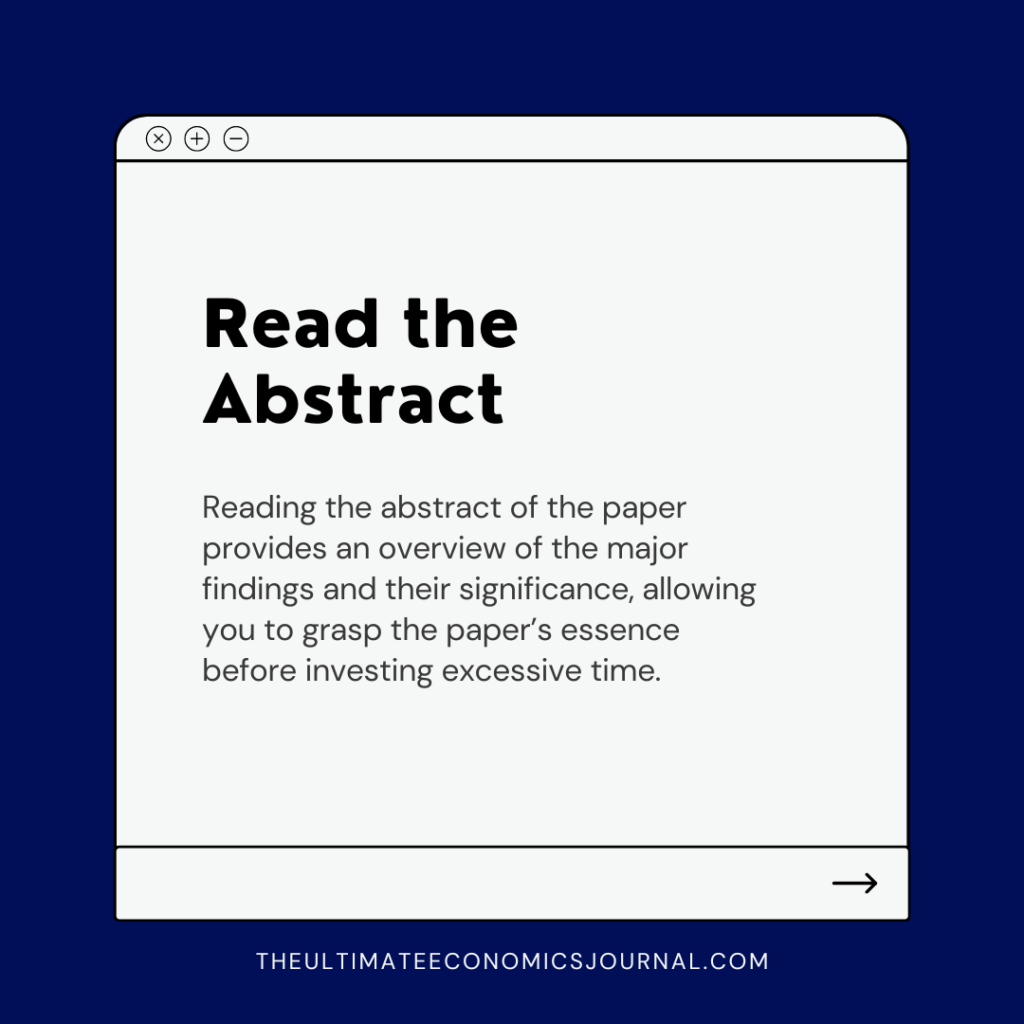
Reading the abstract provides an overview of the major findings and their significance, allowing you to grasp the paper’s essence before investing excessive time.
2. FOCUS ON KEY SECTIONS: Three main sections of a research paper can provide a comprehensive summary and general understanding. These sections are the introduction, literature review, and conclusion. In the introduction, the author(s) aim to capture the reader’s interest, explain the paper’s purpose, identify prior work, highlight contributions, and outline the paper’s structure.

The literature review section presents an integrated analysis of relevant scholarly writings and evidence pertaining to the research question. By reading this section, you can assess the quality of previous research, compare different studies, and identify gaps in the current literature. Conclusions, being shorter sections, serve two primary purposes. Firstly, they provide a retrospective view by summarizing the main areas covered, restating the study’s aim, and summarizing key findings. Secondly, they offer final insights by suggesting implications for the field, explaining the significance of the findings, acknowledging limitations, and making recommendations for further research. These sections provide crucial information about the research paper, indicating its importance to your own study. They assist in determining whether you should delve deeper into the paper or not. If time is a constraint, you can focus on reading the introduction, literature review, and results section to gain a general overview without engaging in a complete reading. By following these tips, you can efficiently navigate research papers, extract key information, and discern their relevance to your own research endeavors.
3. TAKE NOTES: A crucial aspect of comprehending the author’s train of thought is to pay close and undivided attention to the material being read. Taking notes while reading is immensely beneficial, enhancing your reading comprehension and aiding in retaining key points. As you progress through the research paper, important questions may arise, or you may come across ideas that can be applicable to your own research study.
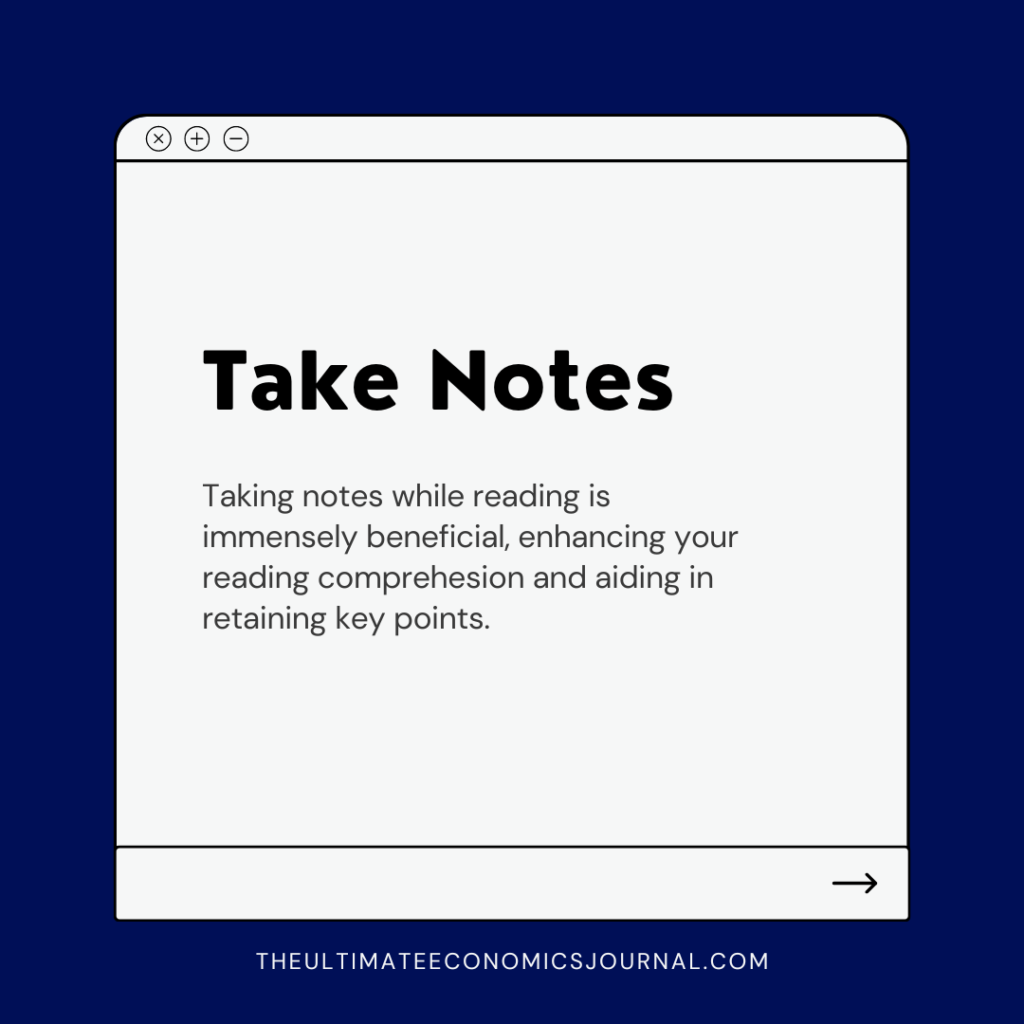
Jotting down these insights is essential to prevent them from slipping away once you have finished reading. By keeping meticulous notes, you can track your thought processes during the research reading phase. While you may initially believe that you will remember everything you read, whether it’s for class assignments, professional papers, proposals, or your thesis, details tend to fade over time.

Therefore, capturing your thoughts and observations in notes is a prudent practice to preserve valuable information.
4. ASK THOUGHT-PROVOKING QUESTIONS: As mentioned earlier, reading an entire article from start to finish can be time-consuming and overwhelming. To make the process more manageable, you can break down your understanding of each section by asking pertinent questions about the research. This approach helps to deepen your engagement with the material. When reading, consider the following ten important questions:
- Motivation: What specific knowledge or question is the author(s) seeking to explore or answer
- Method: What approach did the author(s) employ to conduct the research?
- Approach: Why did the author(s) choose this particular methodology? Understanding the reasoning behind their choice provides context within the field and reveals whether they used established frameworks or took an innovative approach.
- Data: What is the source of the data used in the study?
- Results: What do the results of the research reveal? Figures and tables often provide a comprehensive overview of this information.
- Interpretation and Discussion: How did the author(s) interpret the result
- Weaknesses: What potential limitations or factors might influence the results?
- Supporting Evidence: Are the results unique and supported by existing work in the field? This helps determine if the publication aligns with or challenges established knowledge, confirming the extent of its contribution.
- Replication: Can the study be replicated? Assessing the replicability of the research may inspire ideas for your own work.
- Future Research Directions: What avenues for further investigation are suggested? While the author(s) may provide some suggestions in the discussion section, it is valuable to consider your own thoughts on what future research should entail.
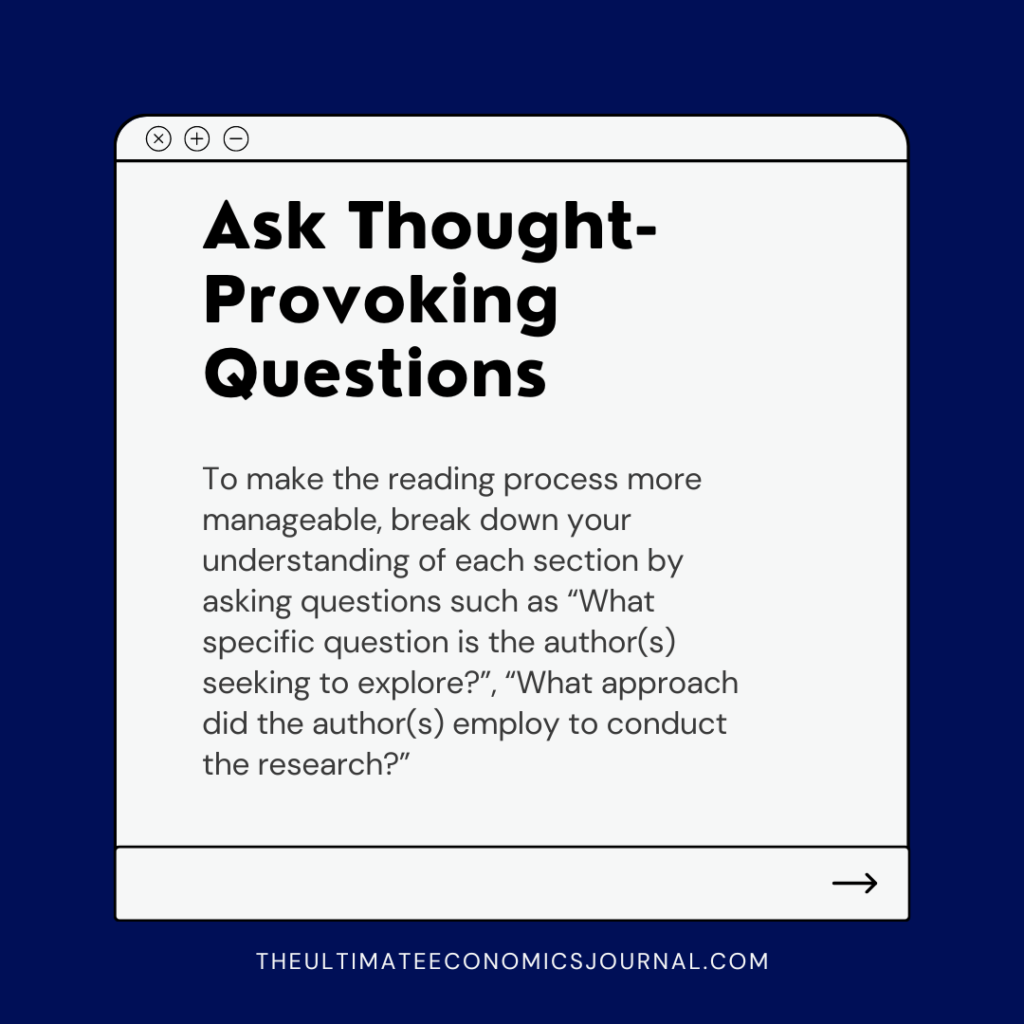
By actively asking these questions, you can delve deeper into the research, critically analyze the findings, and identify potential avenues for further exploration.
5. ORGANISE YOUR NOTES WITH A SPREADSHEET: Managing all the information and answers to the questions above in a Word document can be overwhelming and difficult to track over time. To optimize your reading experience, consider creating a spreadsheet to record your notes on the research papers you read. As your collection of articles grows, this will assist you in differentiating and quickly referencing the relevant sources for your own writing.
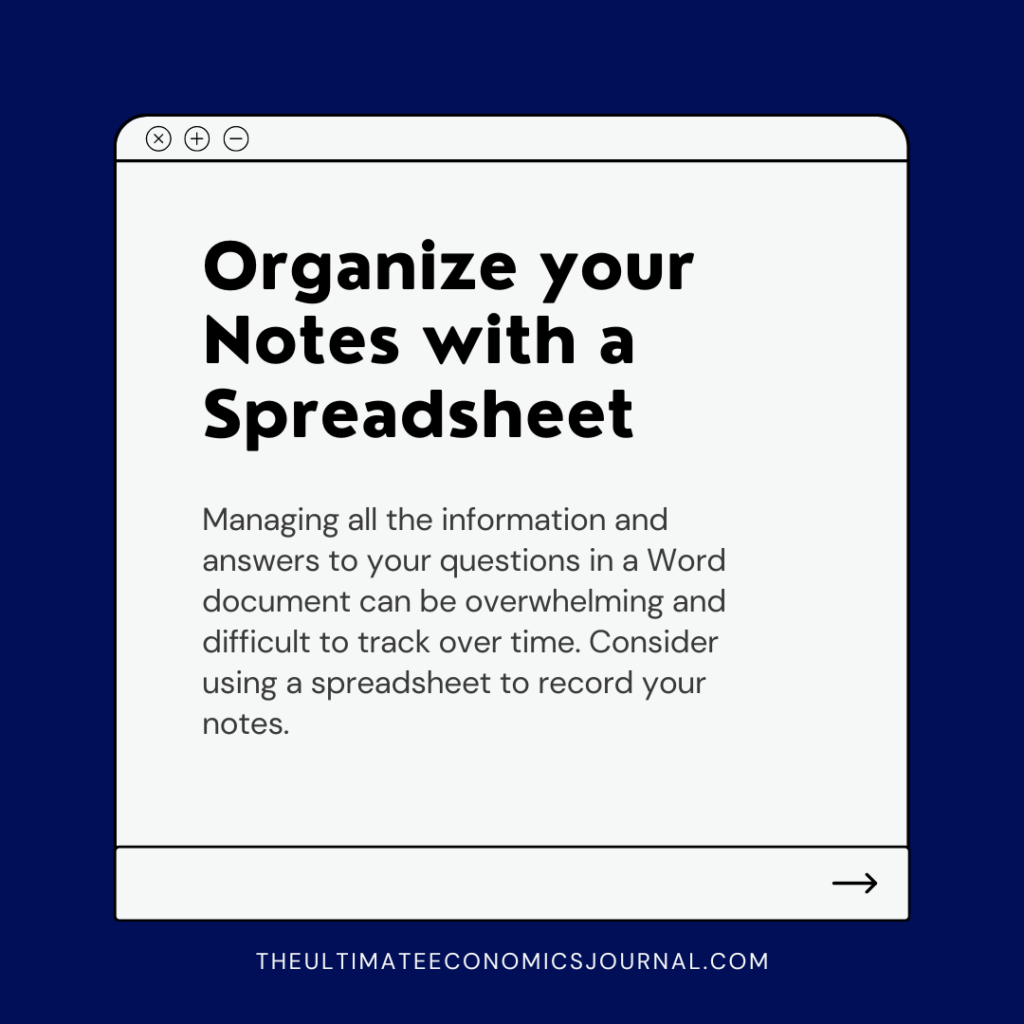
The time invested in filling out the spreadsheet will save you hours of searching and reading when you need to write sections such as the background, related work, or literature review. The spreadsheet template can include the following headings:
- Complete Citation: Author(s), Date of publication, Title (book or article), Journal, Volume #, Issue #, Pages.
- Web Access: URL and Date accessed.
- Key Words
- Specific Research Field: For economics papers, include the JEL classification code, which is a standard method of categorizing scholarly literature in the field of economics.
- Research Questions
- Methods
- Data
- Results
- Summary of Key Points
- Important Figures and/or Tables (with a brief description and page number)
- Significance: The research paper’s relevance to the field and its connection to your own work.
- Future Research Work
- Cited References to Follow Up On: Note down articles related to your topic and any frequently cited papers, as they may prove essential in the development of your own work.
- Other Comments
- Remember to use quotation marks when capturing exact wording to avoid accidental plagiarism when citing the article later.
6. UTILIZE A REFERENCE MANAGER: While organizing your downloaded research papers in a computer folder can work, using a reference manager offers additional benefits, especially due to their powerful search functions. Numerous options are available, ranging from free tools like Zotero and certain versions of Mendeley to paid programs like Papers, Refwork, and EndNote (which may be free through your institution). Take the time to research and select a reference manager that best suits your needs. It can greatly simplify the management and tracking of your papers as you continue to collect them.
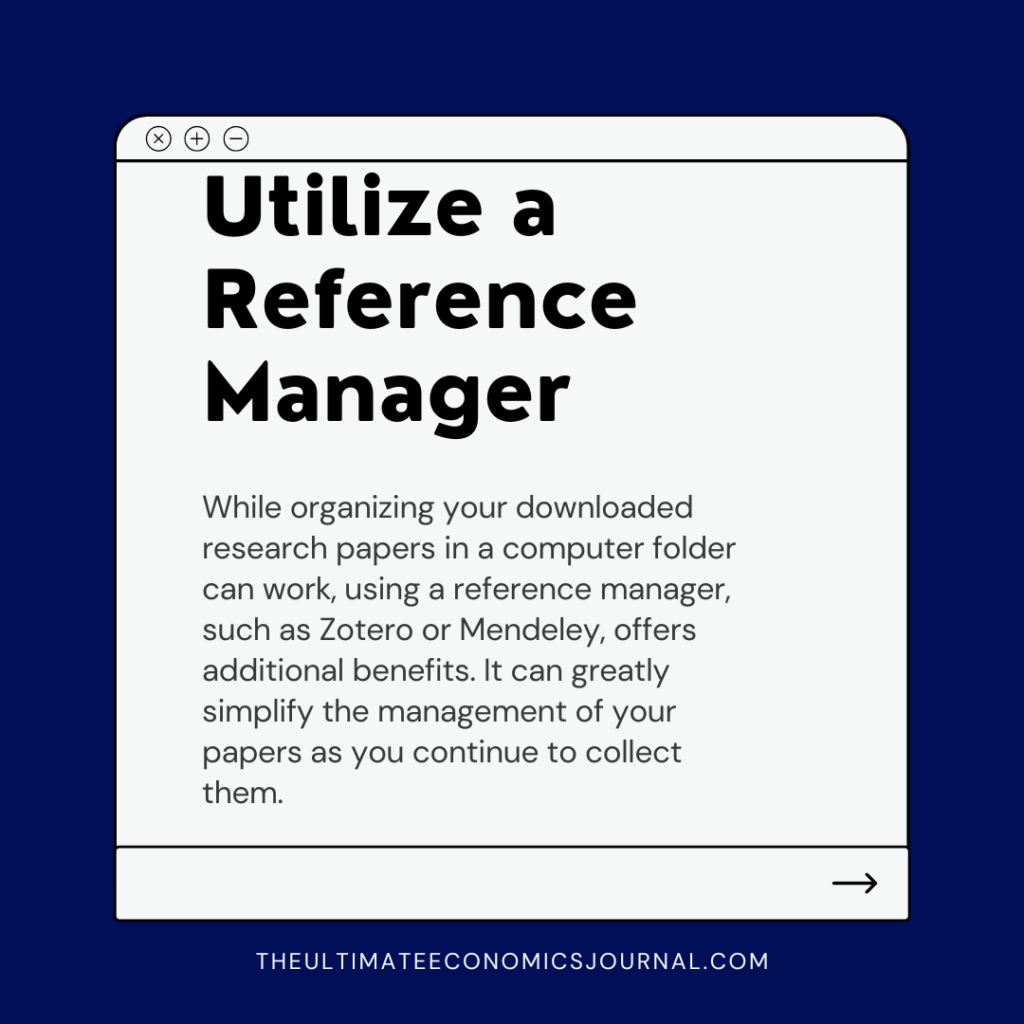
Note: The terms “research paper” and “paper” are used interchangeably throughout this blog post.
This blog post was authored by Eniola F.
We hope that you have found this information valuable! Have any of these tips proven effective for you in the past? Or which of these tips do you believe would be most helpful? We invite you to share your thoughts and experiences in the comments section below. Don’t forget to share this post with your friends or on your social media platforms.

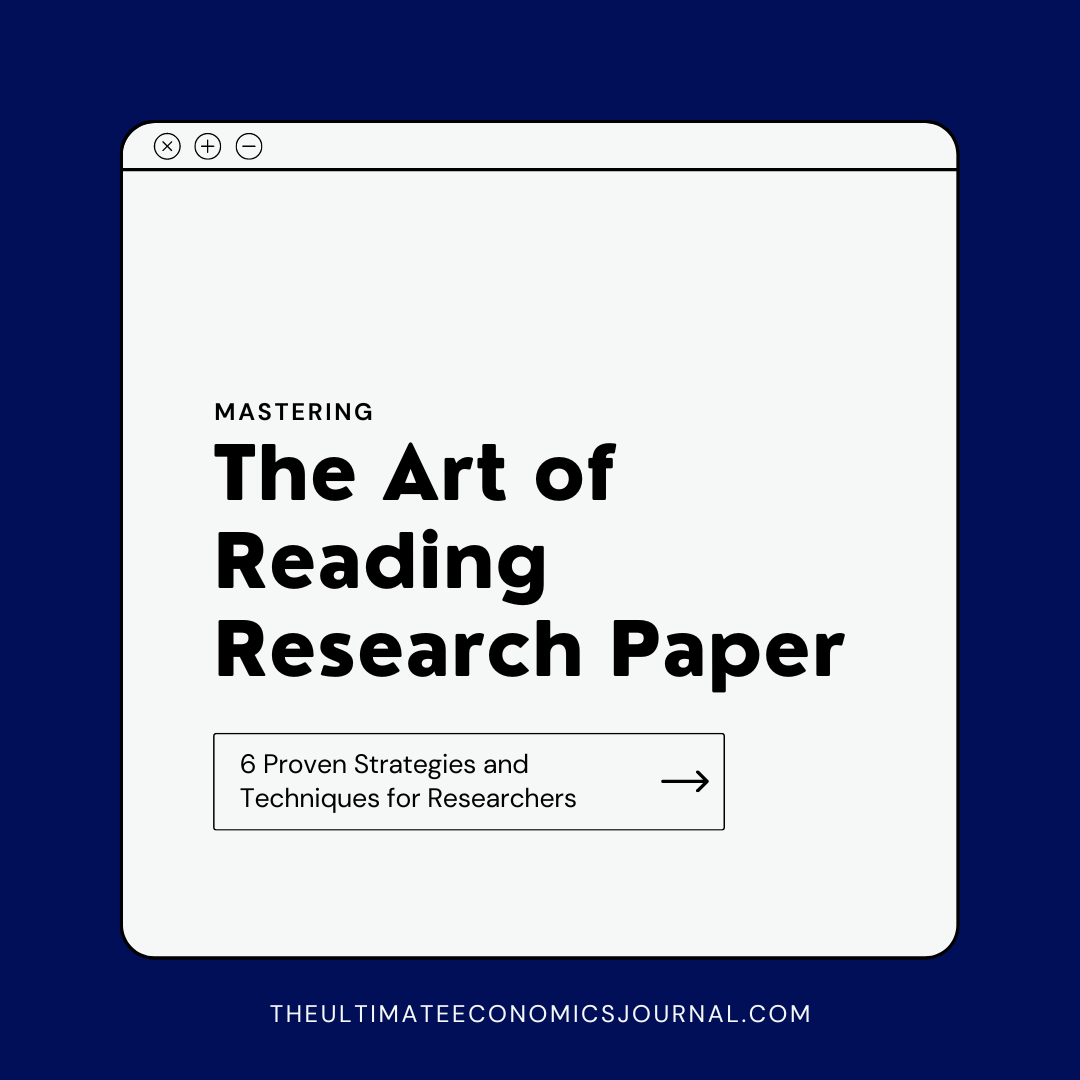

13 thoughts on “Mastering the Art of Reading Research Papers: Six Proven Strategies and Techniques for Researchers”
Hello! I’ve been following your blog for a while now and finally got the bravery to go ahead and give you a shout out from Huffman Tx! Just wanted to tell you keep up the excellent job!
Thank you so much for the kind words.
It is great to see that the resources on the website are making a positive impact! Kindly share our website with others who might benefit from it.
Also, subscribe to our newsletter if you have not. Thanks.
Thank you for some other informative website. Where else could I am getting that kind of info written in such a perfect manner? I’ve a project that I’m simply now working on, and I have been on the glance out for such information.
Hello! I just wanted to ask if you ever have any issues with hackers? My last blog (wordpress) was hacked and I ended up losing many months of hard work due to no back up. Do you have any solutions to stop hackers?
We understand your concern about hacking and the frustration of losing valuable work. However, we do not provide expertise or solutions on cybersecurity issues.
Hello! I could have sworn I’ve been to this site before but after checking through some of the post I realized it’s new to me. Anyways, I’m definitely happy I found it and I’ll be bookmarking and checking back often!
Hi! Quick question that’s totally off topic. Do you know how to make your site mobile friendly? My web site looks weird when viewing from my iphone 4. I’m trying to find a theme or plugin that might be able to correct this problem. If you have any suggestions, please share. Cheers!
Appreciate it for this post, I am a big big fan of this internet site would like to go along updated.
I am always invstigating online for articles that can benefit me. Thx!
Great post. I was checking continuously this blog and I am impressed! Extremely helpful info particularly the last part 🙂 I care for such info a lot. I was seeking this certain info for a long time. Thank you and good luck.
Very interesting points you have noted, regards for putting up.
You completed a few nice points there. I did a search on the issue and found the majority of people will agree with your blog.
Nice post. I was checking continuously this blog and I’m impressed! Very useful information specifically the last part 🙂 I care for such information a lot. I was seeking this particular information for a very long time. Thank you and best of luck.
Comments are closed.